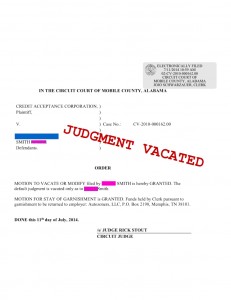Can you keep your house if you file bankruptcy in Alabama?
Sometimes. Yes, that’s a disappointingly lawyerish answer and I hate that for you. I really do. Because i love straight answers as much as anyone else, and if you’re considering filing bankruptcy then things are probably not great in your life right now and the one thing you do need from a lawyer is a little bit of certainty. So what is the deal?
First, what sort of bankruptcy are you talking about? The kind where you get rid of everything but the bare necessities and come out fresh like a newborn baby? (Chapter 7).
Or the kind where you make payments for up to 5 years, but you get to keep most all of your stuff? (Chapter 13.)
In Chapter 7 bankruptcy, the amount of assets you get to keep depends on the law of your state. Some states like Florida have laws that are very generous to people in financial trouble. Other states, like Alabama, have laws that are very harsh on people in financial trouble. Here, we have a $5,000 homestead exemption. That means that you can keep your creditors from ever touching your home — if it is worth less than $5,000.
But who on Earth lives in a home worth less than $5,000? A lot of people, really. Because most people nowadays don’t own their homes. A bank owns their homes and most people, even those whose names are on their deeds, are virtually renting. See, if your home is worth $100,000, and the bank’s mortgage lien is $97,000, then your home is not a $100,000 asset, but a $3,000 asset.
So in Chapter 7, you can generally keep your home if you have less than $5,000 of equity. And generally you need to be current on the mortgage. And you’ll have to keep making those payments. And you may have to reaffirm the debt. NOTE: if you’re married and you and your spouse are both on the deed (not the Note, but the deed – this is a distinction that matters), then you each get a $5,000 exemption that you can combine into one awesome $10,000 exemption, so you can protect twice as much equity. Yay!
What happens if you have more equity than Alabama’s 1940 exemption statute allows?
Well, in Chapter 7, you have two options: 1. Surrender the property to the Trustee. Or 2: pay the amount of non-exempt equity to the Trustee from some other source of funds. Like borrowing from family after the bankruptcy is filed or using exempt money (like a 401k, which gets special federal protection and isn’t subject to Alabama’s crappy exemption statute).
The Chapter 7 trustee’s job is to gather up all your valuable stuff and sell it for the benefit of your creditors. He’ll do that if you have anything worth taking that isn’t specifically protected.
So can you lose your home by filing bankruptcy? Absolutely. It doesn’t always happen, and everybody seems to know somebody who filed bankruptcy and got to keep everything.
Now what about Chapter 13?
A thirteen gives you more flexibility than a seven, and you’re allowed to keep more assets. The trade-off is that you’re stuck making payments to the bankruptcy court for years to come. And Chapter 13 can really limit your financial freedom.
But, if you do have a little bit of equity, Chapter 13 lets you pay that off over time instead of just losing it outright. So in essence, you’re telling your creditors: “You know that $5,000 of home equity that you’ll theoretically get if I filed Chapter 7 and liquidated everything? Why don’t I pay you that amount over the next three years instead?”
And that’s basically what you can do. Chapter 13 has its drawbacks, to be sure. Your debts aren’t discharged until you finish paying, and if you don’t finish paying, then they basically pop right back up in your face. And you have very limited financial freedom. And the attorney’s fees are higher, and your credit takes longer to rebuild. I’m making it sound great, right?
But for some people, its the right move. In all honesty.
